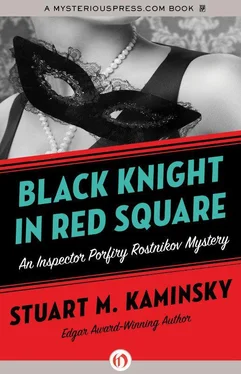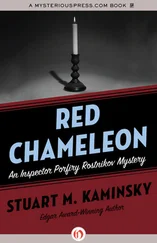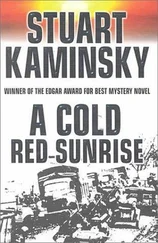Stuart Kaminsky - Black Knight in Red Square
Здесь есть возможность читать онлайн «Stuart Kaminsky - Black Knight in Red Square» весь текст электронной книги совершенно бесплатно (целиком полную версию без сокращений). В некоторых случаях можно слушать аудио, скачать через торрент в формате fb2 и присутствует краткое содержание. Год выпуска: 1983, ISBN: 1983, Издательство: Fawcett, Жанр: Полицейский детектив, на английском языке. Описание произведения, (предисловие) а так же отзывы посетителей доступны на портале библиотеки ЛибКат.
- Название:Black Knight in Red Square
- Автор:
- Издательство:Fawcett
- Жанр:
- Год:1983
- ISBN:9780804104050
- Рейтинг книги:5 / 5. Голосов: 1
-
Избранное:Добавить в избранное
- Отзывы:
-
Ваша оценка:
- 100
- 1
- 2
- 3
- 4
- 5
Black Knight in Red Square: краткое содержание, описание и аннотация
Предлагаем к чтению аннотацию, описание, краткое содержание или предисловие (зависит от того, что написал сам автор книги «Black Knight in Red Square»). Если вы не нашли необходимую информацию о книге — напишите в комментариях, мы постараемся отыскать её.
Black Knight in Red Square — читать онлайн бесплатно полную книгу (весь текст) целиком
Ниже представлен текст книги, разбитый по страницам. Система сохранения места последней прочитанной страницы, позволяет с удобством читать онлайн бесплатно книгу «Black Knight in Red Square», без необходимости каждый раз заново искать на чём Вы остановились. Поставьте закладку, и сможете в любой момент перейти на страницу, на которой закончили чтение.
Интервал:
Закладка:
There was someone else in the car who did not get out, but Rostnikov was less concerned about that. They would only switch street men if they were reasonably sure Rostnikov had spotted him. It was almost certain that the two men knew he was a police inspector and not an enemy of the state, but the KGB was assembling a dossier on him so as to be able to apply political pressure later on. They would be most effective, but they would not suspect him of anything unusual.
Later, he knew he would have to discover the identity of the KGB men who were watching the German, Bintz.
As Rostnikov stood before the desk of the general manager of the Rossyia Hotel, he concluded that the task he had set for himself would not be quite as easy as he had expected.
He had hoped the director would be harried and of average competence, but as it turned out, the man was quite shrewd. He easily juggled the frequent calls on his forty-button telephone without losing track of the discussion.
The office was large, with wood paneling and a green carpet. It contained a conference table, a desk, and a closed-circuit television system with monitors showing the three lobbies of the massive hotel. There was also a glass case holding a portrait and a small statue of Lenin.
“We have never done anything like this before,” the manager was saying, folding his hands on the desk and making it clear to Rostnikov that he viewed his request as a very serious one. He was a tall, sharp-featured man with steel gray hair. Rostnikov felt that the man would project the same significance to any request that disrupted the normal routine of the hotel.
“It is very important,” Rostnikov said. He had declined a chair, hoping that he could intimidate the manager by standing over him, but when that proved useless, he had backed away and become as matter-of-fact and businesslike as he could.
“You will have to sign a form accepting full responsibility,” the manager said after taking a call during which he did not remove his eyes from Rostnikov.
Rostnikov nodded.
“I will also have to call your superior to confirm that this has been approved,” the man said, reaching out to take yet another call.
Rostnikov had not considered this possibility, and while the manager was on the phone, he looked at Lenin for help.
“Yes,” the manager was saying into the phone, running a hand through his carefully combed hair. “If you expect that many employees. As long as we do not go over the one hour allotted for each. Yes, I know it is the hotel Party’s responsibility to keep up the moral level of all employees, and I am not in any way suggesting that we limit the lectures. In fact, I think the subject for this week is excellent. Let me see…” He took his eyes off Rostnikov long enough to find a blue sheet of paper on his desk. “ ‘The Ideological Struggle between Socialism and Capitalism in Today’s World-How It Can Be Stepped Up.’ I will, of course, attend if at all possible. By all means. Let us meet on Tuesday. Eleven in the morning.”
With that the manager hung up, shaking his head.
“We have over three thousand employees in the hotel, Chief Inspector,” he said. “Can you imagine the logistics necessary to ensure that they all have time off to attend lectures for the collective?”
“Considerable,” said Rostnikov.
“Considerable,” agreed the manager. “Now, I will have to call your superior.”
“Procurator Timofeyeva,” said Rostnikov. “She is well aware of the circumstances surrounding this investigation. Unfortunately, she is in the hospital with a heart condition, and she doesn’t have a phone in her room. If you wish,” he said looking at his watch, “we have just enough time to get to the hospital, talk to her, and get back to the hotel, but we’d have to hurry.”
The manager’s gaze looked on Rostnikov as the bank of telephone lights blinked their demand. Rostnikov was counting heavily on the man’s unwillingness to take time out from his busy job to make such a check. He might send an assistant, in which case Rostnikov would have to work something out to fool whoever was sent. He was not at all sure he would be able to fool the manager.
“Ah,” sighed the manager, tapping his fingers on the desk. “We’ll forget about it for now, though I would like an official memo from him.”
“Her,” corrected Rostnikov. “Comrade Timofeyeva is a woman.”
“Her,” said the manager, bowing his head slightly to acknowledge his error. “I’ll have a statement of responsibility prepared for you to sign when you are finished. You are confident that Herr Bintz will make no complaint?”
“He will make no complaint,” Rostnikov assured him.
The manager reached for the phone and, before answering, looked at Rostnikov and opened his hands in a so-be-it gesture. Rostnikov nodded and turned to leave the office.
“Yes, we have an interpreter for Gujarati,” the manager was saying into the phone, “but I’ll have to check on who it is and whether he is on duty. I’ll call you…”
And Rostnikov was gone. He had already checked with his office and had been given a message from Ivanolva, the man who had been trailing Bintz. It was quite evident that the German was out for the afternoon. In fact, according to Ivanolva, he was at the Moskva Swimming Pool with his Intourist guide. So Rostnikov had plenty of time.
He took the elevator up to the German’s room and entered, using the passkey the manager had given him. Although Rostnikov had taken a few trips in his life, always on police business, he was not particularly adept at packing clothes, and he was surprised at the large amount that Bintz had brought with him. The oversized shirts and four suits constituted a wardrobe far larger than Rostnikov’s, but then, Bintz was a reasonably well-known capitalist filmmaker. It took Rostnikov almost half an hour to pack everything. He had estimated that it would take much less time.
There was no need to call the airport again. He had already called from a street phone that could not be tapped or traced. The next trick was to get the suitcases to a taxi. He did not want the KGB men to see him and get curious. But Rostnikov had thought of all of this. He had also taken the packet from his pocket and put it in one of the suitcases, hiding it among a pile of scripts and notes.
He had investigated enough cases to know that the Soviet authorities would almost certainly not disturb the luggage of a German tourist, especially one who had been invited to the Moscow Film Festival. Actually, those leaving on Moscow flights were seldom given any trouble, which surprised many tourists. Rostnikov was also sure that Bintz would not be subjected to search in Berlin. He had checked and found that West Berlin’s customs officials were even more lax than Moscow’s. It was the British, French, and Americans whom tourists and businessmen complained most of.
Rostnikov struggled down to the elevator with the luggage and descended to the second floor. Then he found a freight elevator just off a second-floor ballroom. The elevator was large and almost empty. The man who ran it questioned him and he showed him his police identification and told him in serious tones that he was engaged on official business that the man had best ignore.
The man was a Muscovite and knew well how to ignore what he was told to ignore.
“Is there a freight office?” Rostnikov asked when the elevator stopped on the ground floor in a service area behind the main ballroom.
“There,” said the man, pointing, and Rostnikov lugged the suitcase forward, kicking a light brown leather case along the floor. He pushed the freight office door open, dropped the suitcases, and ignored the gray-capped young man at the small desk, who scowled up at him. Rostnikov fetched the leather case, then whipped out his identification before the man at the desk could speak.
Читать дальшеИнтервал:
Закладка:
Похожие книги на «Black Knight in Red Square»
Представляем Вашему вниманию похожие книги на «Black Knight in Red Square» списком для выбора. Мы отобрали схожую по названию и смыслу литературу в надежде предоставить читателям больше вариантов отыскать новые, интересные, ещё непрочитанные произведения.
Обсуждение, отзывы о книге «Black Knight in Red Square» и просто собственные мнения читателей. Оставьте ваши комментарии, напишите, что Вы думаете о произведении, его смысле или главных героях. Укажите что конкретно понравилось, а что нет, и почему Вы так считаете.












